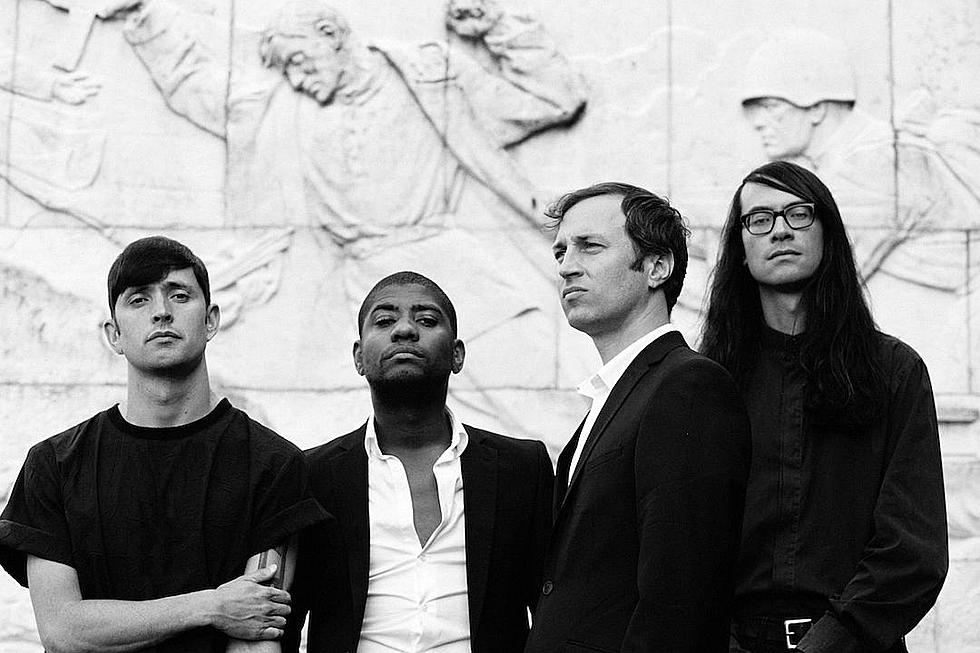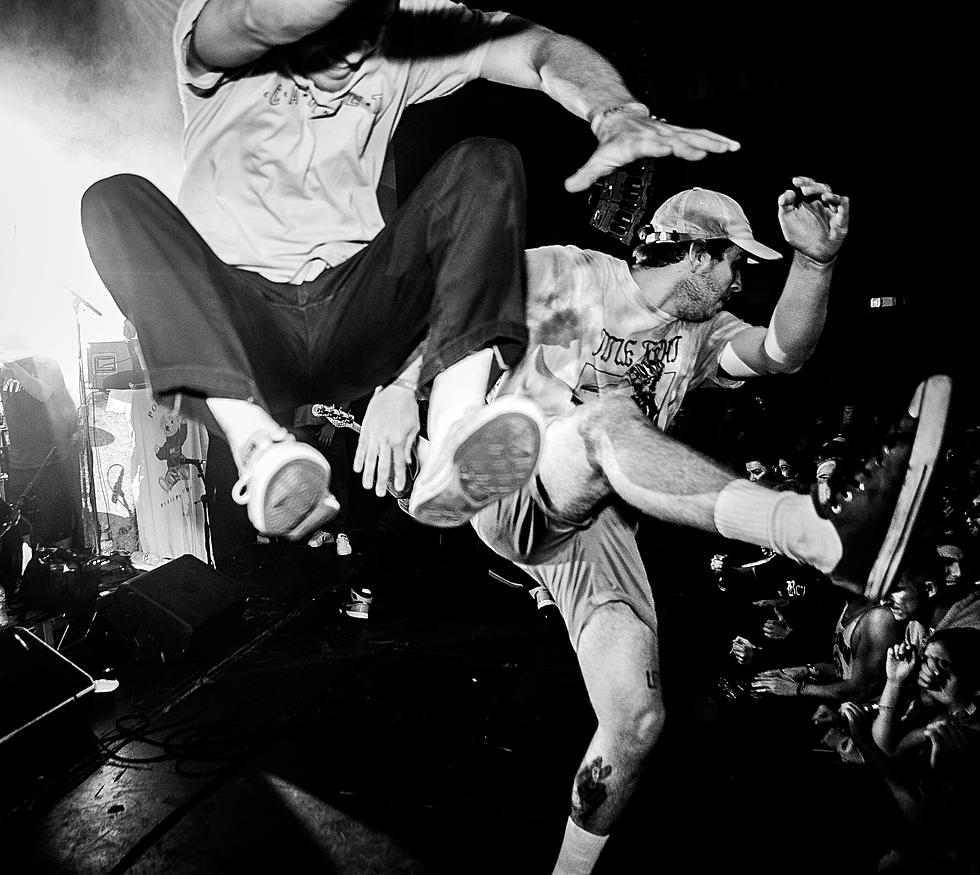
Hope Trumps Failure for Ambitious Doombringers Aseethe
With their cavernous, achingly slow mergings of doom, drone and noise, Aseethe have become a favorite among heavy-minded peers since they emerged from Iowa City a decade ago. The trio has issued a steady stream of releases and shared the stage with groups such as Converge, SUMAC and YOB while remaining largely below the radar, even by underground standards.
Earlier this year, Aseethe signed with longtime distribution partner Thrill Jockey, and are set to release their latest album, Hopes of Failure, on February 24. Produced by Shane Hochstetler at Howl Street Recordings in Milwaukee, the band aimed to capture some of the spirit and raw energy that flows through their live performances in a studio record, and they passed that test with flying colors.
Aseethe grew out of a solo project that guitarist / vocalist Brian Barr created for the sole purpose of playing a local noise show hosted by a friend. “I had done a lot of noise stuff on my own, and I did this show on a whim," he says. "I decided to program drums and do an actual piece, rather than just noise, and I got a really good response. I had never intended for it to be a full-fledged project — it was something I did for fun." Barr decided to keep the project going, and after releasing a split with local heavyweights Mauul and some light touring, he relocated to the Bay Area.
Life on the West Coast proved to be a bit of a mixed bag, creatively speaking. “What they say about big cities — sometimes you are stuck within a mile-and-a-half radius," Barr admits. "San Francisco is pretty expensive, and when I moved to the Bay Area, I didn't have enough money to get out of the city and tour on my own.” The little touring he did was based around trips back to the Midwest for unrelated reasons — for example, booking a few shows around a friend’s wedding.
Eventually, Barr moved back to Iowa City for good and grew Aseethe into a proper trio that currently includes his brother, Danny Barr, on bass and vocals, and Eric Dierks on drums and samples. Despite their city’s small size compared to the Bay Area, it’s provided ample opportunities for the group to thrive. “When I moved back to the Midwest, there was familiarity," Barr notes. "I'd been booking my own tours for 15-plus years, so I already had the contacts, and it’s a lot less expensive to live in the Midwest, so there were more opportunities to get out. There are so many cities [in the region]: Chicago, Minneapolis, St. Louis … We’re kind of in the center, which makes it easy to do weekend runs.”
Aseethe have always been rather unassuming about expanding their audience, preferring to take an organic approach to connecting with fans and labels. “We don't tend to cram our band down people’s throats,” Barr says. “We don't feel comfortable doing that. We play shows and record records. If you like it, that's fine, and if you don't, that's fine, too. I'm not one to print up a bunch of demos and mail them out on a whim. Whoever responds to it naturally, I tend to work for them. It's probably because we are introverted dudes.”
The band’s low-key demeanor is a stark contrast to the monolithic weight and volume of their music. For Barr, it’s a necessary balance. “We let the music speak for itself," he says. "For me, personally, playing live, and playing music the way we do is a relief from who we are on a day-to-day basis, so it might be that that power kind of comes from that."
Other elements of that power comes from their choice of gear and the painstaking attention they pay to every note of their songs. “We've always tried to push the envelope as far as our sound," Barr stresses. "We think about what we are using gear-wise, what we are tuning to, how we play each note. Being a doom band, sometimes we're playing one note and then eight measures go by and we haven't played another note yet, so we want power behind that note … To us, it's simple music. We're not playing anything complicated, but to us the timing is complicated, so when we play those notes we try to have that power behind it.”
Adding to the intensity is the band’s regular use of samples and electronics. They’ve articulated this in different ways over the years, from having each member playing synths (in addition to their usual instruments) to having a dedicated keyboardist. In their current configuration, Dierks controls samples from behind his drum kit, a “utilitarian” move that Barr says has allowed him to focus more on vocals.
On Hopes of Failure, Aseethe changed direction once again when it came to samples, paring down their placement to just the bare essentials. “It sounded so good with the three instruments — why muddy the waters, so to speak?" Barr ponders. "There are these very important samples in their appropriate spots, but we tried to not overdo it.”
Arguably, the best example of that is on the album’s final track, “Into the Sun,” which concludes with a layer of barely perceptible fuzz that slowly escalates into an overwhelming, unscalable wall of harsh static. “It’s a bunch of different samples layered on top of each other,” Barr says. “I recorded that a few years ago in my basement, and we finally decided to use it. Towards the end of the song, the point of the noise is to have it swallow the entire band in the sound. It's meant to envelop the listener; as the band fades away, you're just left with this crushing noise.”
That “less is more” approach to samples plays well with the album’s bleak, apocalyptic vibe, which itself is a comment on the state of the world. “Danny and I write a lot of the lyrics off of each other,” Barr says. “I tend to write about the current state of the world — not spelling it out, but like painting a picture. We're destroying our planet on a daily basis, and that's a big lyrical thing for me: how things seem to be completely falling apart, yet there are great people, and there is still hope. It's trying to rail against the powers that be that don't seem to care or are doing it for a few extra bucks, or a few million … It's the single most important and immediate threat to the world. We've passed that carbon threshold already, and we've got another 20-something years to try and pull it back.”
Rather than make overt statements about the environment and other issues he cares about, Barr sees his music as a starting point for conversation and to potentially open minds. “Within the context of Aseethe, we just want it to resonate with people, and if people ask me about it, I'll talk about it more,” he says. “I got more interested in politics from being involved in hardcore, punk and metal, and being in underground culture and alternative ways of thinking, touring around and playing house shows, and talking with people who would ride rails, dumpster-dive and live in punk houses. I have a lot to thank that music scene for. I think it can be a very good mode to communicate with people.”
With the upcoming release of Hopes of Failure, a new chapter is on the horizon for Aseethe, but no matter how deep or dismal their music plunges, those person-to-person connections remain the heart and soul of the band. “The biggest driving point for me — aside from having these songs in my head — is the camaraderie and getting to see people you don't see very often because they play in bands across the country,” Barr says. “I figured we'd continue releasing our own records forever and just play underground. I didn't think any of this would ever happen. So, for me, it's like a whole group of friends that are creative, and that's probably one of the reasons I'm still doing this.”
More From CLRVYNT









